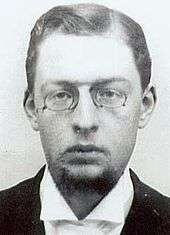Louis Camille Maillard
| Louis Camille Maillard | |
|---|---|
 | |
| Born |
February 4, 1878 Pont-à-Mousson, France |
| Died |
May 12, 1936 (aged 58) Paris, France |
Louis Camille Maillard (French: [majaʁ]; February 4, 1878 – May 12, 1936) was a French physician and chemist.
Early days

He was admitted to the Faculty of Science in the University of Nancy at the age of 16. Eventually his prominence in chemistry, among other natural sciences, led him to join the Faculty of Medicine of the University of Paris as professor Armand Gautier's protégé.
Scientific contributions
In Paris, his work on physiology, in particular the metabolism of urea and kidney illnesses, led him to introduce new theories about "urogenic imperfection" and the concept of the "coefficient of Maillard" or "index of ureogenic imperfection." His ideas proved very useful in the diagnosis of kidney disorders. In 1912, he undertook studies of the reaction between amino acids and sugars. This work is considered one of his major contributions, and the Maillard reaction was named after him. For this variety of work he received several awards including the French Academy of Medicine award in 1914.
Final years
Maillard enrolled in the French army during the First World War, but his health was adversely affected. After the war, Maillard abruptly left Paris in 1919 to occupy a position with the Department of Pharmacy at the Faculty of Medicine Sciences in Algiers (Algeria). During this time, he ceased practically all research.
He died on May 12, 1936, while serving as a juror in Paris.
References
- Site attributed to LC Maillard (English version is fair)
- "Louis Camille Maillard". Louis Camille Maillard, « bienfaiteur de l’humanité ». Archived from the original on October 27, 2005. Retrieved September 10, 2005. (in French)
- Website of the International Maillard Reaction Society